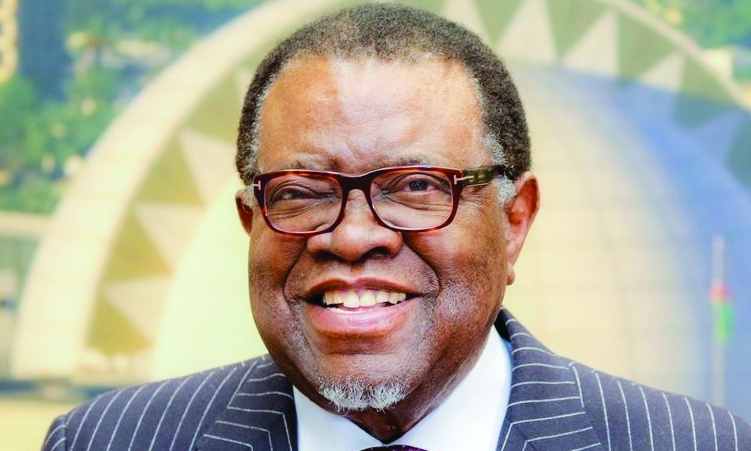Mourning periods are usually not associated with honest assessments of those recently departed. This was very true of the weeks following President Hage Geingob’s death when praise singing dominated the public narrative. This is to some extent inevitable. Eulogies are by their nature tributes rather than balanced accounts. President Geingob’s strong points were indeed stressed while his limitations tended to be glossed over or not mentioned at all.
When responding to numerous media calls following 4 February, I found myself praising what I thought were the best aspects of President Geingob’s time in public office while deliberately not referring to the downsides because I did not want to upset people at a sensitive time in the nation’s history. There was also a need to respect the feelings of the family and those immediately affected by the loss. But this kind of self-censorship, while understandable, is not sustainable. Ultimately, we do need rounded and nuanced accounts of leaders’ lives, especially a person of President Geingob’s standing and significance.
The late president should definitely be credited with playing a key role in Namibia’s development as a democracy. I maintain that President Geingob’s finest hour was his chairmanship of the Constituent Assembly. Of course, there were other high points including his oversight of the civil service in the 1990s as crucial reforms took place and his mediation in various disputes over the years. In recent times, his calm and open leadership during the period of the COVID-19 pandemic was particularly impressive.
While spending options during his time at State House were restricted due to the tight fiscal situation, he did prioritise the welfare of pensioners by increasing the monthly old age grant from N$600 in 2015 to N$1400 at the time of his death.
His green hydrogen dream remained a work in progress at the time of his passing, but may still become the most significant element of his legacy.
President Geingob’s promotion of the tenets of democracy also stood out during an era when basic freedoms and civil liberties have been under siege not only in our region but across the world.
To assess the man and his legacy fully we also must consider his shortcomings. At times he was overly defensive and insensitive – no more so than when he said the hardships inflicted by Apartheid were worse than the sufferings of the genocide period. This carelessness with words was possibly the reason why he overpromised on key socio-economic issues – for example in 2016 when he claimed that poverty in Namibia could be eradicated by 2025. In 2019 similar claims were made about the removal of shacks. Unfortunately, the policies and plans that could have expedited the struggles against poverty and poor housing moved at an agonizingly slow place during his time at State House. This tendency to favour the grandiose instead of the practical was also illustrated by the lack of action following the 2018 land conference.
His period in office was marked by strong rhetoric on issues of public accountability which was also often not followed through. ‘Accountability plus transparency equals trust’ is a wonderful mantra that needs to be seen to be working in practice. The failure to introduce key transparency components into extractive industry-related legislation has left us facing the corruption risks posed by oil, gas and green hydrogen without the necessary legislative armoury to contain and eliminate graft. The six-year wait for the implementation of the whistle-blower protection law is another glaring example. His role in the creation and ultimate collapse of the SME Bank also still needs to be fully assessed. And while suspects were arrested in the Fishrot case, the much-needed corrections in government and the ruling party did not take place during his time in office.
Any assessment of the performance of the economy from 2015 onwards must take into account the significant headwinds caused by COVID as well as persistent droughts and global events which limited finances and knocked plans off course. Still, questions have to be asked about his approach to attracting investment and therefore creating jobs.
He created the Namibia Investment Promotion and Development Board (NIPDB) without introducing the necessary policy measures that would make it easier for investors to do business in Namibia. Investment-related reforms were left on the drawing table for too long, causing confusion for some investors who did not know what to expect regarding NEEEF and the much-criticised drafts of the investment promotion law. Would they be introduced or not and in what form? The NIPDB was effectively left to navigate an important journey without a roadmap.
It is important not to indulge in knee-jerk negativity which can sometimes be an over-reaction to extensive praise-singing. Assessments of any politician who was in power for such a long time should be nuanced – weighing up the strengths and the weaknesses. The adulation of the last few weeks, which for many may have seemed over the top, should not provoke undue negativity.
The very democracy which President Geingob played such an instrumental role in developing is what now allows us to debate his legacy honestly. We should do that without falling into the traps of obsequious praise-singing or ill-considered criticism.
*Graham Hopwood is the Executive Director of the Institute for Public Policy Research (IPPR). A shorter version of this blog first appeared as an article in The Namibian’s commemorative magazine about President Geingob,

